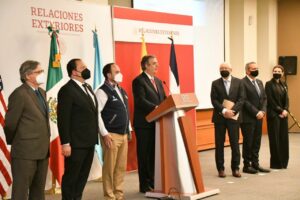Supporters of Bangladesh’s largest opposition party have been demonstrating across the country since mid-November, demanding that former Prime Minister Khaleda Zia be allowed to leave for medical treatment.
A seven-day nationwide protest organized by the student wing of Zia’s Bangladesh National Party ended on December 4th.
Doctors treating Zia said on November 28 that she had advanced cirrhosis of the liver and that it would be difficult to save the 76-year-old opposition leader’s life if she was not allowed to travel abroad immediately for treatment.
Zia, who was sentenced to 10 years in prison for corruption in 2018, has been banned from traveling outside of Bangladesh by the government.
Zia’s party leaders are calling on the government to lift the ban.
For decades, Zia and the current Prime Minister Sheikh Hasina, head of the ruling Awami League party, took turns in government with metronomic regularity. They have been each other’s arch rivals for years and have been called the “Battle Begums” of Bangladesh.
Since Hasina became Prime Minister for the second time in 2009, her party has won all national elections and has been in power for twelve years.
In February 2018, Zia was convicted of embezzling $ 252,000 in foreign donations to an orphanage trust in Bangladesh. She was sentenced to five years of rigorous imprisonment. Later, following an appeal by the prosecutor, a higher court increased the prison sentence to 10 years.
Zia’s supporters say the indictment and conviction were politically motivated.
Zia’s sentence was suspended by the government in March 2020 and she was released on parole due to the risk of contracting COVID-19. The sentence has been suspended on condition that she cannot leave the country and that she needs medical treatment in Bangladesh.
Bangladesh Justice Minister Anisul Huq said last week that the current law allows the government to suspend the execution of a sentence “with or without conditions”.
“[While suspending her sentence] we have added the condition that she cannot go abroad. We also added that she would be receiving medical treatment in Bangladesh. It is actually free. She is not in government custody, ”Huq said in parliament after a BNP MP called for Zia’s release and permission to treat her abroad.
The Justice Minister does not speak the truth, said exiled BNP chief AKM Wahiduzzaman.
“The medical team said Begum Khaleda Zia urgently needs to undergo medical procedure at an advanced liver care facility overseas. Does she have the freedom to leave Bangladesh for medical treatment? No, she is not allowed to travel abroad. She’s out of jail. But it’s actually not free, ”Wahiduzzaman, a former Bangladeshi university teacher who fled to Malaysia in 2016, told VOA.
During a protest in Dhaka on November 30, 2021, supporters of Bangladesh’s largest opposition party, the BNP, demand that their former Prime Minister Khaleda Zia be allowed to leave the country for medical treatment.
According to her family doctor, Zia is diabetic and suffers from kidney, heart, liver and other ailments. She has recovered from COVID-19, which she was diagnosed with five months ago. Her health recently deteriorated and she was admitted to the intensive care unit of a private hospital in Dhaka in mid-November.
After examining Zia last week, a five-member medical board said at a press conference that she had advanced cirrhosis of the liver.
“If she doesn’t undergo TIPS now, she will likely have internal bleeding again soon,” said Dr. Fakhruddin Mohammad Siddiqui, Chairman of the Board, on November 28th. He was referring to a medical procedure called a transjugular intrahepatic portosystemic shunt that helps stop bleeding from a cirrhotic liver.
Dr. Mohammad Samsul Arfin, another board member, said TIPS is a sophisticated medical procedure that is not available in Bangladesh. He said it is being done at some advanced medical centers located in the UK, US and Germany.
Hasina has so far refused requests from Zia’s family and the BNP to allow the former prime minister to go abroad for treatment.
Hasina said she did “quite a bit” to help Zia, who was ill.
“I allowed her to leave prison, stay home, and receive medical treatment. Isn’t that a lot? ”Asked Hasina.
Hong Kong-based human rights activist Mohammad Ashrafuzzaman said the judicial mechanism of Bangladesh has been subjugated and has become an instrument of repression in the hands of the government.
“The systematic denial of access to justice for hundreds of disappearances and several thousand extrajudicial executions clearly shows that the entire criminal justice system serves the purposes of the incumbent regime,” Ashrafuzzaman, liaison officer for the Asian Legal Resource Center, told VOA.
Dhaka-based human rights group Odhikar says that nearly 600 dissidents in Bangladesh have disappeared and gone in the past 12 years. The group also said there had been around 3,500 extrajudicial killings.
https://www.voanews.com/a/supporters-of-ex-bangladesh-pm-demand-she-be-allowed-to-travel-for-medical-treatment/6340167.html












/cloudfront-us-east-2.images.arcpublishing.com/reuters/JEUL2B5V7BJCFMRTKGOS3ZSN4Y.jpg)



/cloudfront-us-east-2.images.arcpublishing.com/reuters/DYF5BFEE4JNPJLNCVUO65UKU6U.jpg)

/cloudfront-us-east-2.images.arcpublishing.com/reuters/UF7R3GWJGNMQBMFSDN7PJNRJ5Y.jpg)












